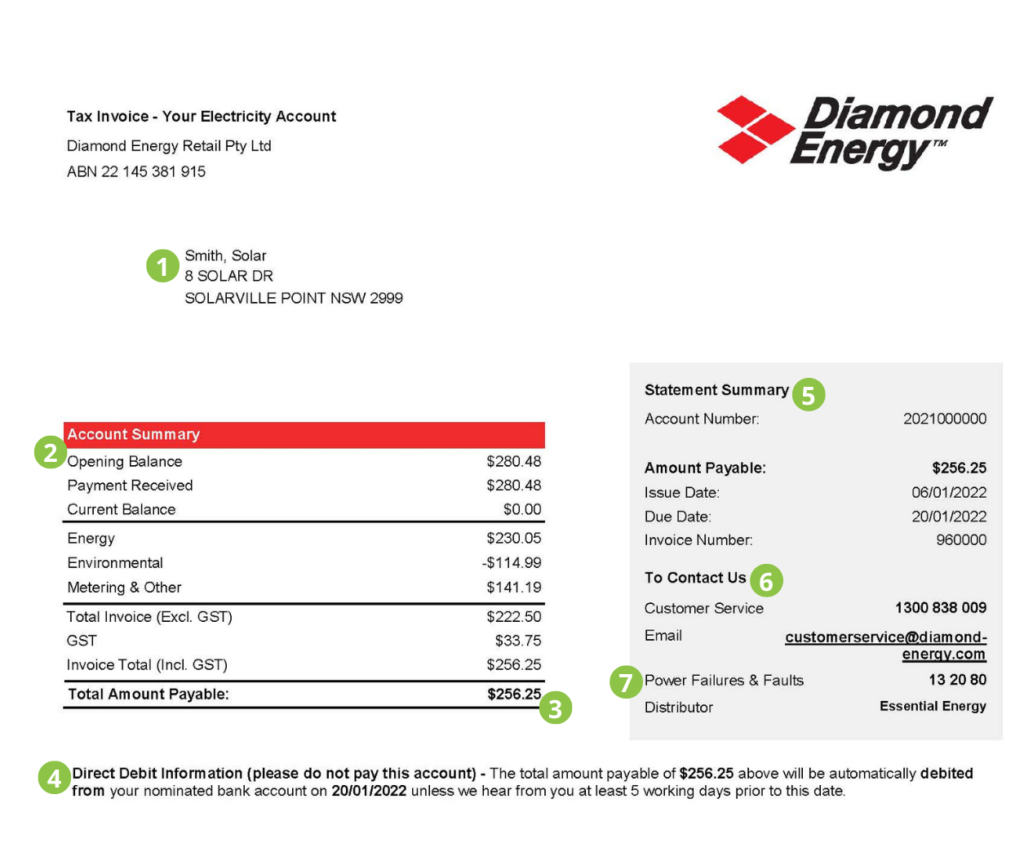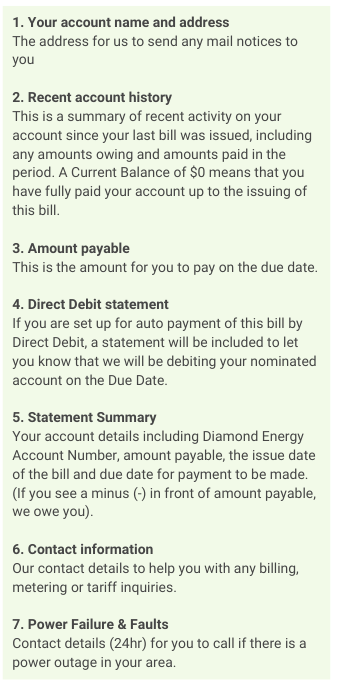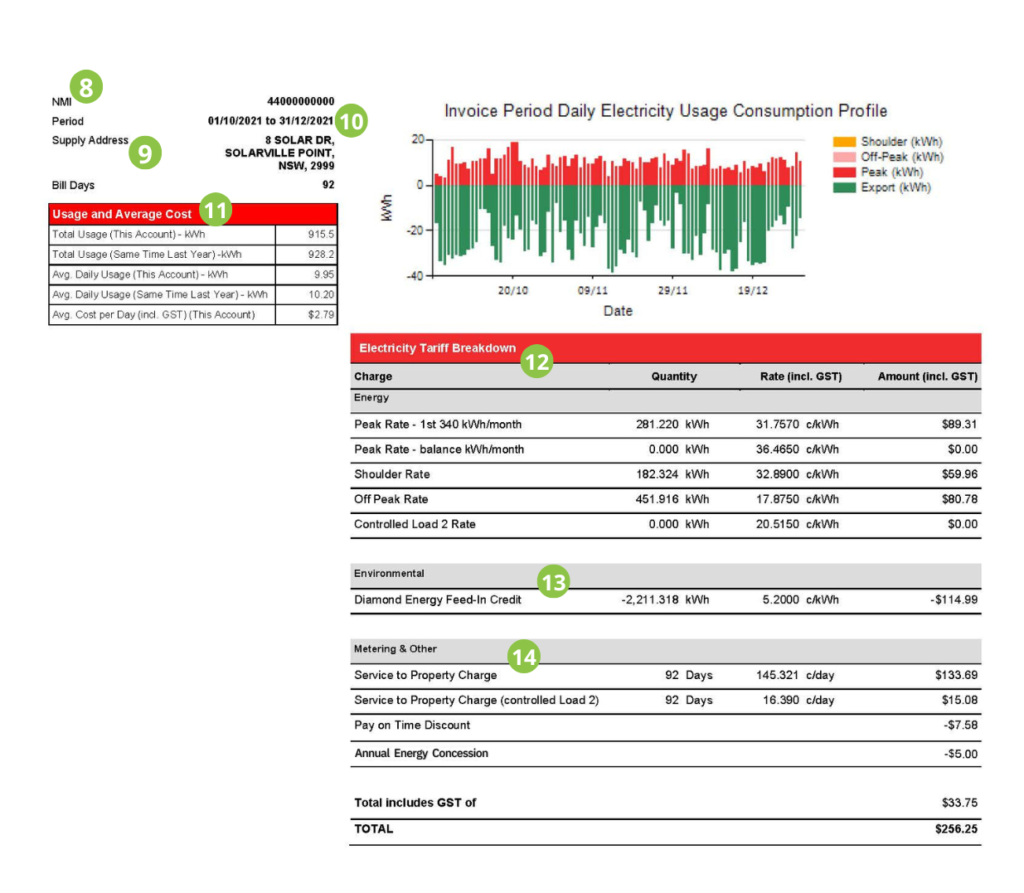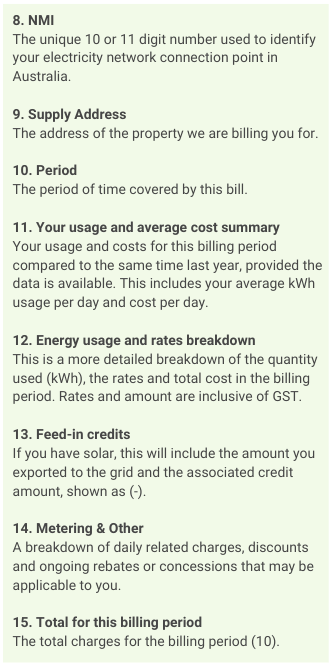You can see a reference guide for our new bill format for residential and small business customers (effective 1st October 2023).
If you are a large business or commercial customer then you can also find information to understand a large customer invoice.
You can also find out about the available payment options.
Page 1


Page 2


Here are some common reasons for an unexpected high bill. We’d like to help you understand why your bill may be high and give you some ideas on how to save energy and then save on your bill.
Check your daily usage on your most recent bill. Is it unusually high and how does it compare for the same time last year?
There are many factors that influence home electricity usage, but average home use is typically in the order of 10 to 20kWh per day from the grid.
To help you reduce your bill we have compiled some efficient usage tips.
Hot summers and cold winters can result in increased electricity usage with energy guzzling heaters and air conditioners. Comparing your usage from the same period last year can be helpful. Heating and cooling may account for up to 40% of your energy usage.
If you have a solar system, you may enjoy low bills when the sun is shining and higher grid usage and bills when there is less sunshine.
If you have a smart meter you can also find a breakdown of your 30 minute, daily and monthly usage and solar export with MyAccount, our customer portal.
It’s possible your bill may be higher than you expected because we have had to estimate your bill rather than provide you a bill with actual usage data. The most common reason for receiving an estimated bill is that the local distributor has been unable to access your meter when they tried to read it.
If you receive a high bill containing an estimated read, you can see options and recommendations here.
If you have an old meter that requires reading by your distributor and is difficult for them to access, you can find out more about upgrading to a smart meter.
Has something in your life changed recently? You may be using more electricity if you installed a pool, have visitors stay, installed new home appliances or even continue to use old appliances that are less energy efficient.
The change in energy efficiency of old household appliances can cause surprising shocks to your bill. Old fridges with poor seals and old hot water systems are common causes of increased electricity consumption.
If you have a smart meter you have access to 30 minute interval reads. These are generally uploaded overnight for the previous day. You can start by identifying usage patterns over the day. If you don’t have a smart meter, you can check your meter manually. You can also enquire about upgrading to a smart meter.
If you aren’t running many appliances overnight, you will likely be able to get an idea of your ‘baseline’ usage (usage from appliances that are running all the time).
You may then notice ‘spikes’ in usage when you start using more appliances. It may be useful to take note of what appliances are running at difference times of the day. You can then log in the following day to look at the usage. Compare what appliances are running with ‘spikes’ in usage.
If you have a solar system, you can find out how to run a range of simple, safe steps to check that the system is performing. If your solar system is not working or underperforming, you’ll be using more grid electricity to compensate and your bill will be higher.
Most solar systems allow you to check the total and daily kWh generated through the inverter display. You can do an online search of the inverted make and model to find out more.
You may also consider contacting your solar installer for advice and arranging a potential maintenance inspection.
Your bill could be higher this month because the billing period is longer. Your bill will rarely cover the same number of days per billing period. See for the number of days in your billing period.
If you move to a new property, your bill may also be higher or lower. Your daily usage kWh may change due to the number, age and efficiency of the various household appliances and the type of home heating.
The electricity rates of your new property may also be different. Electricity rates are based on which local distributor region (local poles and wires company) your property is located in. The distributor charges may be up to half of your bill and vary across different distributor regions.
Also, you should check your billing period, as it may have changed.
If you’d like to learn more about ways to save energy and save on your bill, you can see our efficient usage tips. If you have solar then we have additional information to help you maximise your solar and save even more.